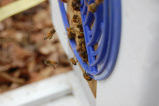|
The Perils of Microwaving Honey: Preserving Nature's Sweet Elixir Honey, nature's golden nectar, has long been revered for its culinary versatility, medicinal properties, and abundance of beneficial nutrients. However, despite its many benefits, there is one common practice that can significantly diminish its value: microwaving. While microwaving may seem like a quick and convenient way to soften crystallized honey or warm it for use, it comes with a hidden cost – the degradation of its precious enzymes and micronutrients. Enzymes are biological catalysts that play a crucial role in various metabolic processes, including digestion and nutrient absorption. Honey contains a rich array of enzymes, including amylase, invertase, and catalase, each with its unique function. Microwaving, with its intense and uneven heating, can disrupt the delicate structure of these enzymes, rendering them inactive. This loss of enzymatic activity not only diminishes the honey's natural flavor and aroma but also deprives us of the health-promoting benefits these enzymes provide. In addition to enzymes, honey also boasts a wealth of micronutrients, including vitamins, minerals, and antioxidants. These micronutrients contribute to honey's overall nutritional value and are associated with various health benefits. However, microwaving can also compromise the stability of these micronutrients, leading to their degradation and loss of potency. The detrimental effects of microwaving on honey's enzymes and micronutrients are primarily due to the excessive heat generated during the process. Honey is a heat-sensitive substance, and temperatures above 110 degrees Fahrenheit can begin to damage its delicate components. Microwaves, with their ability to rapidly heat liquids, can easily exceed this safe threshold, causing irreversible damage. To preserve the integrity of honey's enzymes and micronutrients, a gentler approach is recommended. Gently steeping honey in a double boiler, where the temperature is maintained below 110 degrees Fahrenheit, is a safe and effective method for softening crystallized honey or warming it for use. This gentle heating method ensures that the honey's beneficial components remain intact, preserving its natural flavor, nutritional value, and health-promoting properties. So, the next time you reach for that jar of honey, resist the urge to zap it in the microwave. Instead, opt for the gentler method of a double boiler, and savor the true essence of nature's sweet gift. Your taste buds and your body will thank you for it. The Perils of Microwaving Honey: Preserving Nature's Sweet Elixir Honey, nature's golden nectar, has long been revered for its culinary versatility, medicinal properties, and abundance of beneficial nutrients. However, despite its many benefits, there is one common practice that can significantly diminish its value: microwaving. While microwaving may seem like a quick and convenient way to soften crystallized honey or warm it for use, it comes with a hidden cost – the degradation of its precious enzymes and micronutrients. Enzymes are biological catalysts that play a crucial role in various metabolic processes, including digestion and nutrient absorption. Honey contains a rich array of enzymes, including amylase, invertase, and catalase, each with its unique function. Microwaving, with its intense and uneven heating, can disrupt the delicate structure of these enzymes, rendering them inactive. This loss of enzymatic activity not only diminishes the honey's natural flavor and aroma but also deprives us of the health-promoting benefits these enzymes provide. In addition to enzymes, honey also boasts a wealth of micronutrients, including vitamins, minerals, and antioxidants. These micronutrients contribute to honey's overall nutritional value and are associated with various health benefits. However, microwaving can also compromise the stability of these micronutrients, leading to their degradation and loss of potency. The detrimental effects of microwaving on honey's enzymes and micronutrients are primarily due to the excessive heat generated during the process. Honey is a heat-sensitive substance, and temperatures above 110 degrees Fahrenheit can begin to damage its delicate components. Microwaves, with their ability to rapidly heat liquids, can easily exceed this safe threshold, causing irreversible damage. To preserve the integrity of honey's enzymes and micronutrients, a gentler approach is recommended. Gently steeping honey in a double boiler, where the temperature is maintained below 110 degrees Fahrenheit, is a safe and effective method for softening crystallized honey or warming it for use. This gentle heating method ensures that the honey's beneficial components remain intact, preserving its natural flavor, nutritional value, and health-promoting properties. So, the next time you reach for that jar of honey, resist the urge to zap it in the microwave. Instead, opt for the gentler method of a double boiler, and savor the true essence of nature's sweet gift. Your taste buds and your body will thank you for it.
0 Comments
Leave a Reply. |
Details
SEABEE HONEY BLOGAuthorA beekeeper in New Hampshire [email protected] Archives
December 2023
Categories
All
|

 RSS Feed
RSS Feed